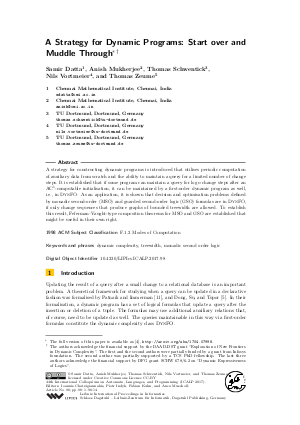A Strategy for Dynamic Programs: Start over and Muddle Through
Authors Samir Datta, Anish Mukherjee, Thomas Schwentick, Nils Vortmeier, Thomas Zeume
-
Part of:
Volume:
44th International Colloquium on Automata, Languages, and Programming (ICALP 2017)
Part of: Series: Leibniz International Proceedings in Informatics (LIPIcs)
Part of: Conference: International Colloquium on Automata, Languages, and Programming (ICALP) - License:
 Creative Commons Attribution 3.0 Unported license
Creative Commons Attribution 3.0 Unported license
- Publication Date: 2017-07-07
File

PDF
LIPIcs.ICALP.2017.98.pdf
- Filesize: 0.55 MB
- 14 pages
Document Identifiers
Subject Classification
Keywords
- dynamic complexity
- treewidth
- monadic second order logic
Metrics
- Access Statistics
-
Total Accesses (updated on a weekly basis)
0Document
0Metadata
Abstract
A strategy for constructing dynamic programs is introduced that utilises periodic computation of auxiliary data from scratch and the ability to maintain a query for a limited number of change steps. It is established that if some program can maintain a query for log n change steps after an AC^1-computable initialisation, it can be maintained by a first-order dynamic program as well, i.e., in DynFO. As an application, it is shown that decision and optimisation problems defined by monadic second-order (MSO) and guarded second-order logic (GSO) formulas are in DynFO, if only change sequences that produce graphs of bounded treewidth are allowed. To establish this result, Feferman-Vaught-type composition theorems for MSO and GSO are established that might be useful in their own right.
Cite As Get BibTex
Samir Datta, Anish Mukherjee, Thomas Schwentick, Nils Vortmeier, and Thomas Zeume. A Strategy for Dynamic Programs: Start over and Muddle Through. In 44th International Colloquium on Automata, Languages, and Programming (ICALP 2017). Leibniz International Proceedings in Informatics (LIPIcs), Volume 80, pp. 98:1-98:14, Schloss Dagstuhl – Leibniz-Zentrum für Informatik (2017)
https://doi.org/10.4230/LIPIcs.ICALP.2017.98
BibTex
@InProceedings{datta_et_al:LIPIcs.ICALP.2017.98,
author = {Datta, Samir and Mukherjee, Anish and Schwentick, Thomas and Vortmeier, Nils and Zeume, Thomas},
title = {{A Strategy for Dynamic Programs: Start over and Muddle Through}},
booktitle = {44th International Colloquium on Automata, Languages, and Programming (ICALP 2017)},
pages = {98:1--98:14},
series = {Leibniz International Proceedings in Informatics (LIPIcs)},
ISBN = {978-3-95977-041-5},
ISSN = {1868-8969},
year = {2017},
volume = {80},
editor = {Chatzigiannakis, Ioannis and Indyk, Piotr and Kuhn, Fabian and Muscholl, Anca},
publisher = {Schloss Dagstuhl -- Leibniz-Zentrum f{\"u}r Informatik},
address = {Dagstuhl, Germany},
URL = {https://drops.dagstuhl.de/entities/document/10.4230/LIPIcs.ICALP.2017.98},
URN = {urn:nbn:de:0030-drops-74470},
doi = {10.4230/LIPIcs.ICALP.2017.98},
annote = {Keywords: dynamic complexity, treewidth, monadic second order logic}
}
Author Details
References
- Patricia Bouyer, Vincent Jugé, and Nicolas Markey. Dynamic complexity of parity games with bounded tree-width. CoRR, abs/1610.00571, 2016. URL: http://arxiv.org/abs/1610.00571.
- Samir Datta, Raghav Kulkarni, Anish Mukherjee, Thomas Schwentick, and Thomas Zeume. Reachability is in DynFO. In Magnús M. Halldórsson, Kazuo Iwama, Naoki Kobayashi, and Bettina Speckmann, editors, Automata, Languages, and Programming - 42nd International Colloquium, ICALP 2015, Kyoto, Japan, July 6-10, 2015, Proceedings, Part II, volume 9135 of Lecture Notes in Computer Science, pages 159-170. Springer, 2015. URL: http://dx.doi.org/10.1007/978-3-662-47666-6_13.
- Samir Datta, Raghav Kulkarni, Anish Mukherjee, Thomas Schwentick, and Thomas Zeume. Reachability is in DynFO. CoRR, abs/1502.07467, 2015. URL: http://arxiv.org/abs/1502.07467.
- Samir Datta, Anish Mukherjee, Thomas Schwentick, Nils Vortmeier, and Thomas Zeume. A strategy for dynamic programs: Start over and muddle through. CoRR, abs/1704.07998, 2017. URL: http://arxiv.org/abs/1704.07998.
- Guozhu Dong, Jianwen Su, and Rodney W. Topor. Nonrecursive incremental evaluation of datalog queries. Ann. Math. Artif. Intell., 14(2-4):187-223, 1995. URL: http://dx.doi.org/10.1007/BF01530820.
- Michael Elberfeld, Martin Grohe, and Till Tantau. Where first-order and monadic second-order logic coincide. ACM Trans. Comput. Log., 17(4):25:1-25:18, 2016. URL: http://dx.doi.org/10.1145/2946799.
- Michael Elberfeld, Andreas Jakoby, and Till Tantau. Logspace versions of the theorems of Bodlaender and Courcelle. In 51th Annual IEEE Symposium on Foundations of Computer Science, FOCS 2010, October 23-26, 2010, Las Vegas, Nevada, USA, pages 143-152. IEEE Computer Society, 2010. URL: http://dx.doi.org/10.1109/FOCS.2010.21.
- Wouter Gelade, Marcel Marquardt, and Thomas Schwentick. The dynamic complexity of formal languages. ACM Trans. Comput. Log., 13(3):19, 2012. URL: http://dx.doi.org/10.1145/2287718.2287719.
-
Neil Immerman. Descriptive complexity. Graduate texts in computer science. Springer, 1999.

-
Leonid Libkin. Elements of Finite Model Theory. Springer, 2004.

- Sushant Patnaik and Neil Immerman. Dyn-FO: A parallel, dynamic complexity class. J. Comput. Syst. Sci., 55(2):199-209, 1997. URL: http://dx.doi.org/10.1006/jcss.1997.1520.
- Thomas Schwentick, Nils Vortmeier, and Thomas Zeume. Dynamic complexity under definable changes. In 20th International Conference on Database Theory, ICDT 2017, March 21-24, 2017, Venice, Italy, pages 19:1-19:18, 2017. URL: http://dx.doi.org/10.4230/LIPIcs.ICDT.2017.19.
- Thomas Schwentick and Thomas Zeume. Dynamic complexity: recent updates. SIGLOG News, 3(2):30-52, 2016. URL: http://dx.doi.org/10.1145/2948896.2948899.
- Saharon Shelah. The monadic theory of order. Annals of Mathematics, pages 379-419, 1975. URL: http://dx.doi.org/10.2307/1971037.
-
Heribert Vollmer. Introduction to Circuit Complexity - A Uniform Approach. Texts in Theoretical Computer Science. An EATCS Series. Springer, 1999.

- Volker Weber and Thomas Schwentick. Dynamic complexity theory revisited. Theory Comput. Syst., 40(4):355-377, 2007. URL: http://dx.doi.org/10.1007/s00224-006-1312-0.
